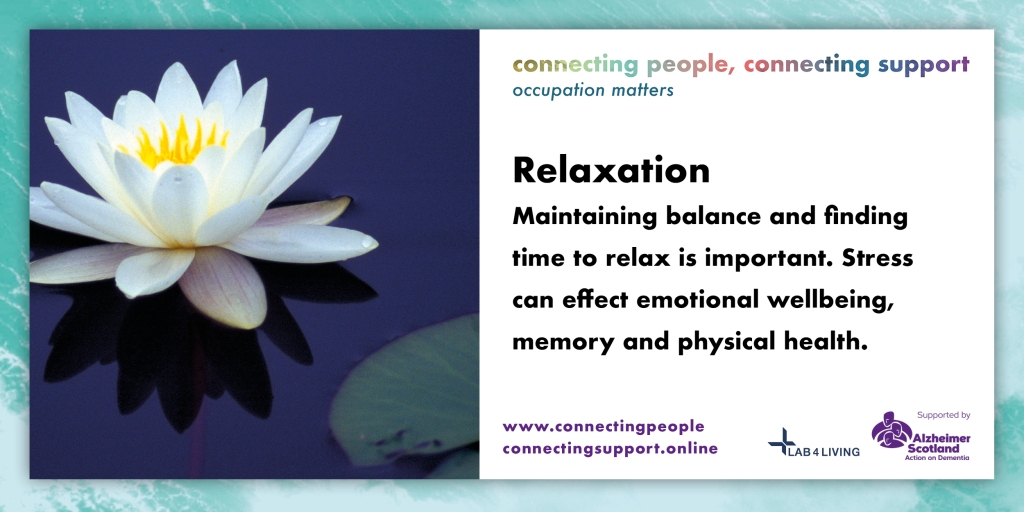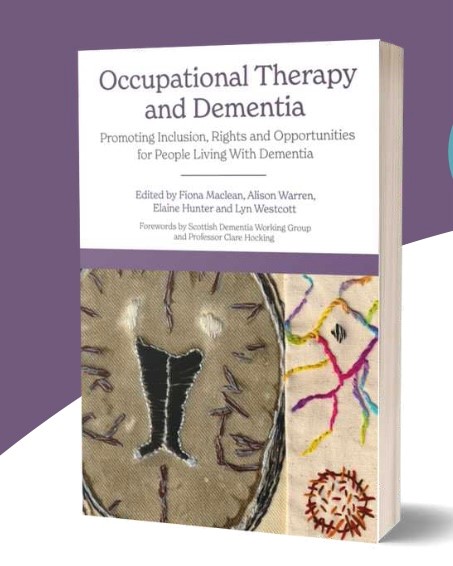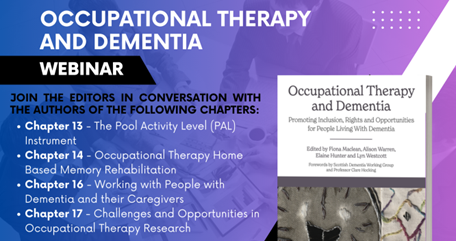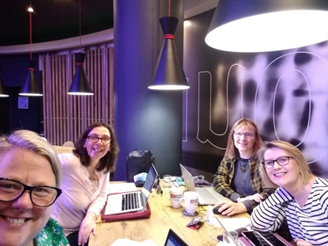Thanks so much to all. Really valuable session.
Really great webinar everyone was super.
Every two months we work together as an allied health professionals community to develop, for you, a national AHP Dementia Webinar where we share the work and practice of allied health professionals in Scotland. Our vision for the webinars is “through working in partnership, we can all improve outcomes for people that really matter”.
Our AHP Dementia webinar in October 2023 with just over 200 people was called “Sharing the importance of driving from the perspectives of lived experience, clinical practice and research”. Our guest presenters were:
Stuart Dougall – Scottish Dementia Working Group (SDWG)
Dr Tashfeen Chaudhry – Scottish Driving Assessment Service, SMART centre, Astley Ainslie Hospital, NHS Lothian
Hazel Douglas – Occupational Therapist Team, Lead Perth & Kinross, NHS Tayside
You can WATCH AGAIN, the webinar link is here
This webinar builds on and provides an update to the previous driving and dementia webinar held in October 2020 that you can also watch here
Your Q&A
During the webinar, participants asked lots of great questions and today we are posting the replies from our webinar host. Please leave any further comments on this blog post to continue the conversation with you at the end of this blog or email us at AHPDementia@alzscot.org
Question: I would like to know whether DriveAbility Scotland have any role to play in driving dementia assessments?
Answer: We are aware of DriveAbility Scotland but they are not affiliated with our service and we do not know anything about their standards or processes so cannot really comment. It is our understanding that they charge clients for assessments unless they have been referred directly by DVLA.
Question: Are there any plans for a change in who can refer a driver to SMART for the full medical driving assessment- given the recent change in the law allowing professionals such as occupational therapists to make fitness to drive decisions and report directly to the DVLA? Answer: We have no plans to change our referral pathways at this time. We still only accept referrals from doctors as there are occasions when we require further medical information before deciding whether we can proceed with assessment and that information is usually best provided by the referring doctor.
Question:, Stuart, what advice would you offer to other people who maybe recently diagnosed with dementia and are concerned about maybe needing to stop driving ? Answer: Firstly, you have to notify DVLA and I would suggest that you inform your insurance company. On your diagnosis you will have advised your suitability to continue to drive. If the Doctor advises you can still drive, I would advise to do so as long as you feel safe to do so, although this will be re-assessed by DVLA and your Doctor on a yearly basis.
You might feel the need to make slight adjustments, like only driving on familiar roads, driving only short or shorter distances than you previously made, but keep going as long as you can as it greatly helps with your independence.
With regards to driving, plan well ahead and treat it no differently as before, don’t over think.
Take your family or friends advice if they think it is time for you to stop driving, then do it as they are the people who are with you most of the time, looking at the overall situation independently and are aware of your situational awareness and ability to react to different situations as they me arise.
Question: What support to you offer or signpost to people when you advise against driving?
Answer: We have a leaflet which gives information about transport alternatives in Scotland. The information is fairly generic as a lot of transport alternatives are provided by local councils and can differ between different parts of Scotland(eg Taxi Cards). We usually suggest the patients we see also contact their local council or check their council website to see what is specifically available to them.
Question: Do people travelling to Edinburgh need to meet their own travel costs?
Answer: As far as we are aware there is no formal process for reimbursement and NHS Lothian cannot provide this. Patients can apply to their own health board for reimbursement but this is not guaranteed and is a decision for each health board.
Question: How do you minimise the potential for subjectivity during the on-road test with different examiners?
Answer: We do as much as we can to minimise the potential for subjectivity. We have a robust and comprehensive training programme for new staff members. The on road assessments are scored on scoring sheets which are standardised and accepted by DVLA. The route that the on road assessment takes place on is also based on national UK standards and is also accepted by DVLA. This all makes sure that as much as possible we are all working to the same standard.
Question: Can I ask where families stand in advising relatives not to drive when the individual with dementia thinks they are still safe to drive but the family do not?
Answer: Families and caregivers have so much to offer within the topic of driving and dementia, however this does bring some significant challenges.
Begin the conversation as soon as possible.
Driving is now routinely discussed as part of the initial appointment for memory screening, this opens up a dialogue within a safe place and with staff there to support the conversation. As a result the family can go on to discuss it after the appointment with their loved one. We encourage families and drivers with dementia to monitor their driving over a period of time against a list of things to look out for, however above all we emphasise that we want to support the person to remain driving for as long as they are able to.
Use a caregiver questionnaire
Enabling the family to complete a written questionnaire about their loved one’s driving is extremely useful, enabling them time to write down any concerns they have, rather than have them speak about it in front of their loved one. It can enable more honesty without risk of causing upset or irritation for their loved one. Families generally wish to protect their relationship with the loved one and may choose not to discuss their concerns in front of them. The staff member can then follow it up via a phone call to the family at a suitable time.
Families who want to eliminate risk or who choose to minimise any risk.
Families react in many different ways. Sometimes well-meaning families wish to eliminate all risk for their loved one and keep them safe, so they may push for the person to be told to stop driving. Premature driving cessation is not good for promoting overall wellbeing and engagement in occupations for a driver and can have a huge impact on their sense of self-worth and personhood.
In these situations it is vital to encourage the family to use a risk enabling approach which may involve modifying driving habits, and results in a win-win situation for everyone.
A lovely example is of a gentleman in his 60s with young onset Alzheimer’s disease who was still working and needed to drive a van as part of his job. We worked with him on an annual basis to complete annual assessments and he was able to retain his licence for a further 3 years which meant that he was also able to remain in employment. His wife worked closely with us each year phoning the team when the DVLA letter arrived so we could book in his annual assessment in a timely way in relation to the DVLA timelines.
After assessment if the person is told not to drive.
This is undoubtedly one of the most difficult situations a family may have to face. If the person with dementia has been advised not to drive following assessment, and they continue to do so:
- If the person won’t give up the car or they need to see tangible evidence that they still have a car, then we have supported families to “loose the keys” or disconnect the battery – so the car is “broken” and waiting to be fixed – with some degree of success.
- For the person who continues to drive against medical advice, their insurance policy is no longer valid and they are breaking the law. In these situations we have no other choice but to inform the DVLA and the local police if required. Situations like this can be very difficult for everyone involved.
We invited you all at the end of the webinar to share something you will take away from today’s webinar and use in your practice, or life, going forward. Here is a selection of your replies. We wish you every success in following up your ideas and inspirations that you shared with us.
Driving and Dementia is an important conversation!
I will await the research paper, but it makes me feel a bit more confident in our clinical practice.
Stuart’s positivity and being comfortable talking about how he knows the day will come that he will no longer be safe to drive.
The amount of people that are assessed as still being able to drive. More hopeful than I had thought.
More detailed knowledge of what driving assessments consist of, often I’m asked about this so I can now give a bit of a better picture of what people can expect.
Practical considerations that require to be made in application of driving assessment in clinical practice.
Dementia is not the end of driving.
What happens at the driving assessment centre, that it is the only centre in Scotland and that occupational therapists could be helpful in carrying out pre-screening for driving assessment in the future?
Stuart’s words about not giving up, that dementia is only one aspect of him, and that just because you can’t peel as potato today doesn’t mean you won’t be able to do it tomorrow.
Where to direct someone who is having to face the possibility of not driving. I will remember the point we as a family decided my mum should no longer drive and whilst I have no doubts that was right, the impact on her independence was significant. Adopt Stuart’s philosophy and concentrate on what you can do.
I will definitely be looking out for Hazel’s paper and looking in to this further as it may impact the assessments carried out by our team.
It is beneficial to know what the process is for assessment of driving, and I have made notes of further research I will do into the subject.
Information I can share with a family member about driving with dementia.
COMING SOON: Wednesday 26th June, 3.30pm-4.30pm where the topic will be Brain Health and the role of allied health professionals to support brain health everyday. Email us at AHPDementia@alzscot.org for more information or to let us know what content you would be interested to learn more about.
Stay connected.
We post daily hints at tips at @AHPDementia
We blog weekly www.alzscot.org/talking_dementia
We use #AHPConnectingPeople & #AHPScot
We support our AHP students to share their work at AHPDementia Instagram
We share self-management resources at www.alzscot.org/ahpresources
We have an email for you to send questions AHPDementia@alzscot.org
We developed an interactive website with 32 resources for you www.cpcs.online












